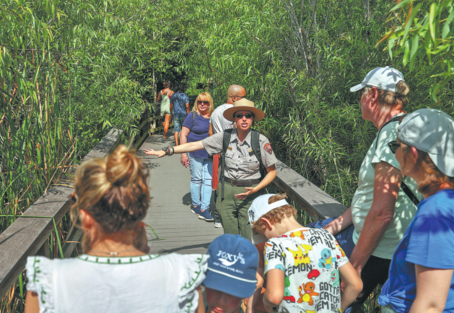
A National Park Service ranger conducts a walking tour in Shark Valley, part of the Everglades National Park, Florida, on April 17.
LOS ANGELES — Reactions are strong to proposed 2026 budget cuts made public last week by US President Donald Trump's administration, which include deep cuts to the national park and forest services that could drastically reduce staff and close parks nationwide.
"This is the beginning of the end for America's legendary national park and forest services," a forest ranger with the national forest service in California said on Tuesday.
"With so many staff laid off, who is going to maintain the parks, reduce wildfire risk and protect the safety of our wildlife and park visitors?"
If approved, the budget would cut more than $1 billion from the National Park Service, making it the largest funding reduction in the agency's 109-year history.
Trump also proposed turning some park sites over to state control, which could remove them from the National Park System entirely, a move never before attempted by any US president, because states typically do not have the means on their own to support them.
"Our national parks and forests are a legacy for the American people and the entire world," a Colorado resident said on Monday. He took his kids to enjoy a different magnificent park each summer.
National parks in the United States, with their iconic, unspoiled natural beauty and unique ecosystems, are widely considered the scenic benchmarks for nature parks across the world.
"What's next?" a visitor from Scandinavia said. "Is Trump going to turn the Grand Canyon into a landfill dump?"
Trump's proposal came at a time when national parks are more popular than ever. More than 331 million people visited national parks across the country last year.
If the budget cuts go through, the result would be fewer rangers, shuttered visitor centers, canceled programs and a serious decline in park maintenance.
Losing employees
The National Park Service and the US Forest Service have both lost thousands of employees. More than 2,400 National Park Service staff, or more than 10 percent of the workforce, are gone, many because of forced resignations or early retirements.
The US Forest Service was hit even harder, losing about 3,400 employees, including rangers, trail crews and wilderness responders.
The effects of these layoffs are already being felt — reduced park hours, closed visitor centers, and canceled tours. At some sites, trails have been shut down indefinitely. Long lines of cars waited to enter the Grand Canyon over Presidents' Day weekend because there were not enough workers to staff the gates.
Theresa Pierno, head of the National Parks Conservation Association, called the budget cut "the most extreme and destructive" in the National Park Service's history.
It threatens the very idea of national parks — places that are meant to be protected forever for everyone to enjoy, Pierno said.
Giving park sites to states is not just risky; it is a betrayal of the public's trust, she said. States often do not have the funding or resources to manage these lands properly, and if they cannot afford it, sites may close or even be privatized.

